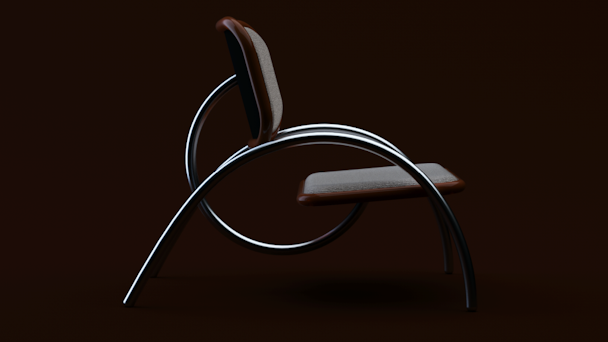These indie and network shops support creative side gigs to keep talent on side
Talent and agencies both benefit when there’s room for creativity on the side. We hear from agencies that have built up a support system to encourage it.

Baumann’s ‘La Chair’, a piece inspired by the international symbol for disability access / Bastien Baumann
Plenty of staffers have side hustles, hobbies and even startups on the DL that don’t have anything to do with their time at the office.
Rico Oyejobi of Wolff Olins co-founded the rum brand Saint Ogun. Katie Beal Brown founded the seltzer brand Lone River Ranch Water during her time at Anomaly. Bastien Baumann, chief design officer at Publicis agency Le Truc, prototypes concept furniture in his spare time. “I was curious to see how I could apply my craft to create something tangible,” he says.
Those projects can burnish the creative reputations of agencies and, in some cases, lead to new work coming in. However, some employers are anxious about staff having a public persona and are subsequently less supportive – something that can lead to a clash. Earlier this week, we asked agencies about how they were building policies that eliminated the risk of conflict between the personal and professional worlds.
Advertisement
The other angle relevant to this topic is how agencies can go about actively supporting staff side projects. Agencies might just be places of work for some staffers, but they also hold significant resources: connections, time with in-house talent, additional leave or even just good old cash. Indie agency Free The Birds, for example, offers bursaries to staff for this purpose. “We actively encourage exploring pursuits both in and out of work, providing our team with an enriched view of the world and their work,” says Nick Vaus, creative strategy director and partner.
And there are agencies that make those resources – generally speaking reserved for paying clients – available to staff on the side.
“Call it a side hustle, a hobby or merely an exploration of self, these endeavors are essential to maintaining an environment that encourages and fosters creativity,” says PPK president Garrett Garcia.
Advertisement
The benefits are clear. Oyejobi says it keeps his mind sharp: “Outside experiences sharpen the same brain and thinking that you’ll use throughout your ‘work’ life too, so there’s a natural, beneficial overlap.”
Brent Turner, executive vice-president of strategy and solutions at Opus, says that the agency celebrates his colleague’s side projects because of a “cold human truth.”
“They provide marketable value – they fuel stories that intrigue clients, connect employees and expand belonging – that benefit your peers, your clients and, thus, the agency overall,” he says.
For indie agency Cream, it’s a green flag among potential recruits. “We recruit team members based on the depth and diversity of their interests, recognizing that true passion on the outside often translates to passion inside a workplace,” says Neil Cunningham, the agency’s chief exec and co-owner.
Joan’s London office, managing director Tom Ghiden explains, is still working to establish itself – but is building backing into its employee offer. “We see alternative passions or side hustles as positives; in a creative industry like ours, broader experience and knowledge drive great insights and better ideas“ he says.
Suggested newsletters for you
Rani Patel, managing director of indie shop Calling, uses a similar strategy. “We always ask potential candidates in interviews: ‘What is your calling?’ That may seem like a big and heavy question to ask at a first-stage interview, but it’s necessary for us to understand the human we’re potentially bringing into our business.”
Side gigs can provide a space to vent and experiment away from the stress and exhaustion of everyday work. Patti McConnell, managing partner at Something Different, says: “This is a tough industry, one becoming increasingly challenging – not unlike the world at large. It’s also a business where the creative heart is held by many disciplines. For each of us to grow and, to some extent, detox from the day-to-day challenges, having hobbies or side-gigs is life-changing. It’s therapy. It feeds our creative souls.”
Peter Nicholson, chief creative officer at Hill Holliday, says: “We have a strategist who is also a social content creator; a creative and digital strategist who owns a Boston-based rare and collectible record store; an SVP creative who doubles as an author; and a designer who paints on the side.” Each, he adds, brings in “fresh perspectives and refreshed energy” to the business.
This doesn’t have to be restricted to indie shops, either. Anomaly has an incubator called Anomaly Fun’ded, for example. “We believe in personal growth and enable it,” says founding partner and executive chairman Carl Johnson.
Jack Morton, meanwhile, celebrates staff projects with a social media series called What’s Your Extra? ”We recognize that the activities people do outside of work fill their cups, make them more well-rounded and even inspire new ideas at work, so we celebrate them,” says chief people officer Natalie Ackerman.
Crispin Porter + Bogusky built its benefits and PTO offer to new recruits around the expectation they won’t be only using their creative skills at work.
Ben Majoy, group creative director, says: “I think our industry needs to evolve the very idea of what we do from ‘advertisers and marketers’ to ‘professional creatives,’ which means side hustles and hobbies are not extra things we do on the side to balance the hustle of the 9 to 5 but are instead a crucial part of the role as a professional creative.
“It’s our job to understand, interpret and build on cultural moments and ideas, therefore we need to be participating in creativity outside of our ‘desk jobs’ and it’s an agency’s job to support and encourage this.”

